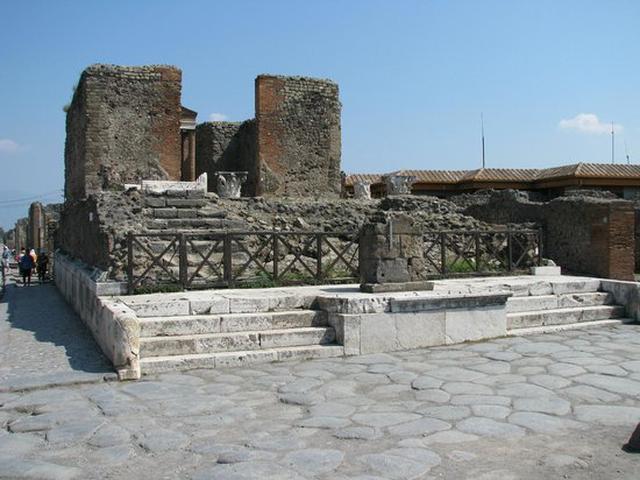Temple of Fortuna Augusta

The Temple of Fortuna Augusta in Pompeii is a fascinating archaeological site that offers a glimpse into the religious and political practices of the ancient Roman city. This small temple, constructed with marble capitals and columns, served as a place of worship dedicated to the emperor Augustus. The altar in front of the temple was used for specific rituals in honor of the emperor, as well as for propagating the ideals of the imperial house by the local elite. The inscription found on the building reveals that it was built by Marcus Tullius, a prominent figure in Pompeii who held the title of duoviri.
Marcus Tullius's investment in the construction of the temple not only showcased his loyalty to the emperor but also solidified his status as a supporter of the imperial regime. The cult of Fortuna Augusta, the goddess of luck and fortune, was central to the religious practices carried out at the temple. The presence of slaves and liberti, individuals with ties to the emperor, further emphasized the connection between the temple and the imperial household. The temple's interior once housed a statue of Fortuna, while statues of the imperial family adorned the niches on the sides of the building.
Despite its grandeur and significance, the Temple of Fortuna Augusta did not escape the ravages of time. The marble coverings that once adorned the temple were removed in the years following the eruption of Mount Vesuvius, which buried Pompeii in ash and debris. The temple's architectural features, including its columns and altar, provide valuable insights into the religious practices and political dynamics of ancient Pompeii. Visitors to the site can marvel at the craftsmanship of the temple's construction and imagine the rituals that took place within its walls.
As one of the many points of interest in Pompeii, the Temple of Fortuna Augusta stands as a testament to the city's rich history and cultural heritage. Exploring the temple allows visitors to step back in time and experience the religious fervor and political allegiance that characterized life in ancient Pompeii. Whether you are a history enthusiast, an architecture buff, or simply a curious traveler, a visit to the Temple of Fortuna Augusta is sure to leave you with a deeper appreciation for the ancient world and its enduring legacy.
© ChatGPT 3.5